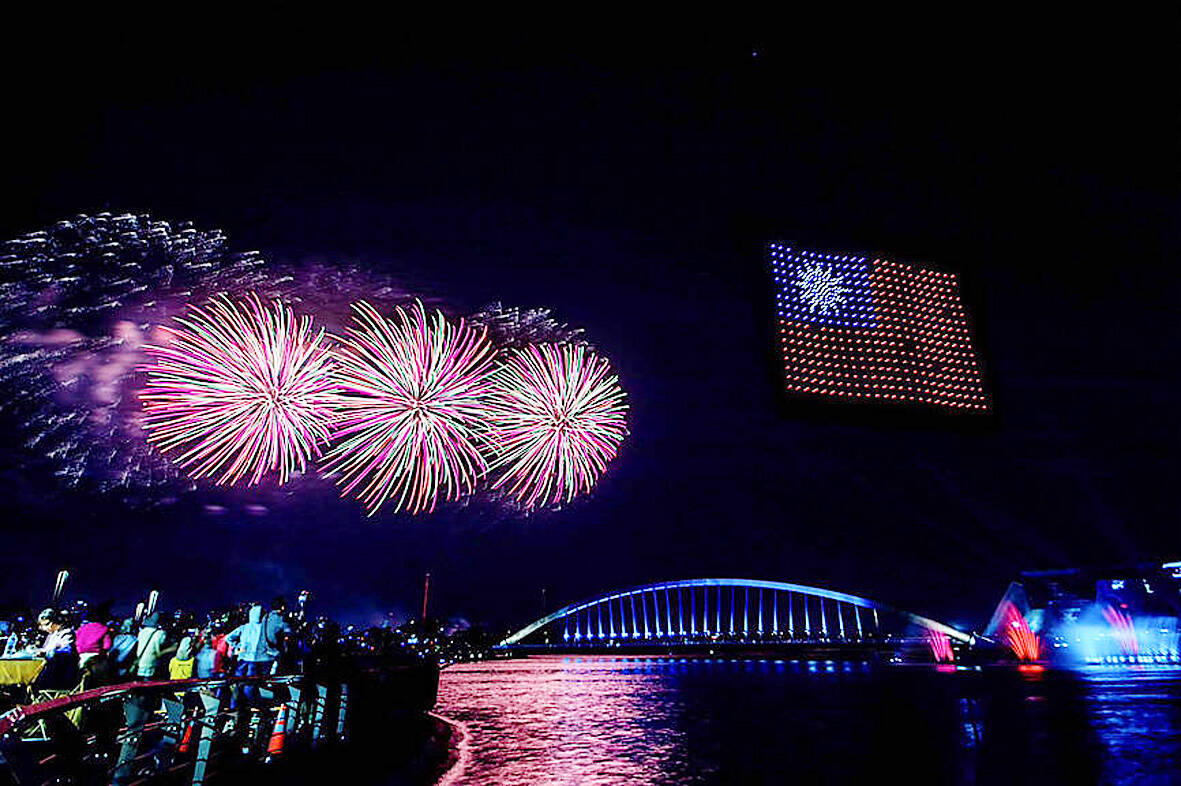The government should address a lack of information security safety measures covering uncrewed aerial vehicles (UAVs) and clarify powers and responsibilities for government agencies managing such devices, the Control Yuan said in a report passed by its Committee on Transportation and Procurement Affairs on Tuesday.
Control Yuan member Chang Chu-fang (張菊芳) and others headed a task force to look into the allegation that drones used in the Double Ten National Day celebrations in 2022 contained Chinese-made chips, the report said.
There is an urgent need to establish certification for general information security or other risk management measures, it added.

Photo courtesy of the Chiayi County Government via CNA
Drones used in the 2022 event did not use chips manufactured in China, it said, but added that further investigation by the Ministry of Digital Affairs showed other models on the market did.
The controversy highlights the lack of a legislative basis to manage information security risks, measures to ensure drones meet standards and other measures in light of a burgeoning UAV market and the diversification of their use, the report said.
Government procurement regulations are lacking, management protocols are unorganized and the government has not implemented or even developed a serial number system for imported drones, it said.
Regulations and preliminary information security measures were not discussed until November 2022 in preparation for the nine-in-one elections, the report said.
The discussion made it clear that the Ministry of Digital Affairs and the Ministry of Transportation and Communications were unclear on matters of jurisdiction and delineation of powers and responsibilities, it added.
The National Palace Museum — which was in charge of procurement of the drones for the 2022 event — should mull over how to improve its processes, the report said.
Had the museum followed the Public Construction Commission’s procurement regulations, the risk of buying drones with Chinese-manufactured chips would have been decreased, it said.
The Civil Aviation Administration should consider stepping up efforts to obtain technology that would allow the registration of radio frequency identification data, the report said.
The Executive Yuan yesterday said that it would look into reviews and options to ameliorate the situation.

CAUTION: Based on intelligence from the nation’s security agencies, MOFA has cautioned Taiwanese travelers about heightened safety risks in China-friendly countries The Ministry of Foreign Affairs (MOFA) yesterday urged Taiwanese to be aware of their safety when traveling abroad, especially in countries that are friendly to China. China in June last year issued 22 guidelines that allow its courts to try in absentia and sentence to death so-called “diehard” Taiwanese independence activists, even though Chinese courts have no jurisdiction in Taiwan. Late last month, a senior Chinese official gave closed-door instructions to state security units to implement the guidelines in countries friendly to China, a government memo and a senior Taiwan security official said, based on information gathered by Taiwan’s intelligence agency. The

The National Immigration Agency (NIA) said yesterday that it will revoke the dependent-based residence permit of a Chinese social media influencer who reportedly “openly advocated for [China’s] unification through military force” with Taiwan. The Chinese national, identified by her surname Liu (劉), will have her residence permit revoked in accordance with Article 14 of the “Measures for the permission of family- based residence, long-term residence and settlement of people from the Mainland Area in the Taiwan Area,” the NIA said in a news release. The agency explained it received reports that Liu made “unifying Taiwan through military force” statements on her online

Taiwan Semiconductor Manufacturing Co (TSMC), the world’s largest contract chipmaker, said yesterday that it is looking to hire 8,000 people this year, at a time when the tech giant is expanding production capacity to maintain its lead over competitors. To attract talent, TSMC would launch a large-scale recruitment campaign on campuses across Taiwan, where a newly recruited engineer with a master’s degree could expect to receive an average salary of NT$2.2 million (US$60,912), which is much higher than the 2023 national average of NT$709,000 for those in the same category, according to government statistics. TSMC, which accounted for more than 60 percent

A magnitude 5.7 earthquake struck off Taitung County at 1:09pm today, the Central Weather Administration (CWA) said. The hypocenter was 53km northeast of Taitung County Hall at a depth of 12.5km, CWA data showed. The intensity of the quake, which gauges the actual effect of a seismic event, measured 4 in Taitung County and Hualien County on Taiwan's seven-tier intensity scale, the data showed. The quake had an intensity of 3 in Nantou County, Chiayi County, Yunlin County, Kaohsiung and Tainan, the data showed. There were no immediate reports of damage following the quake.